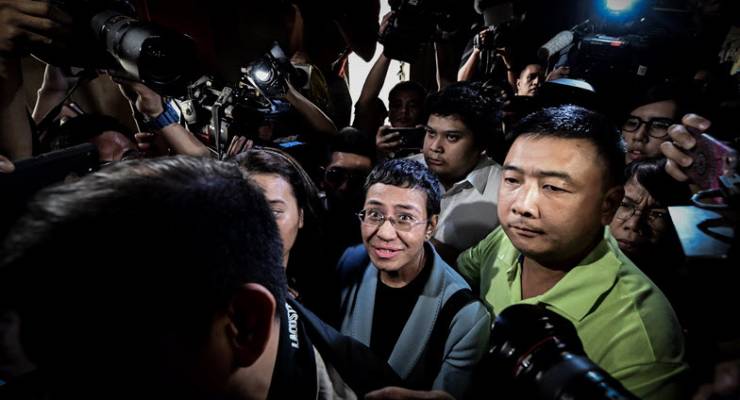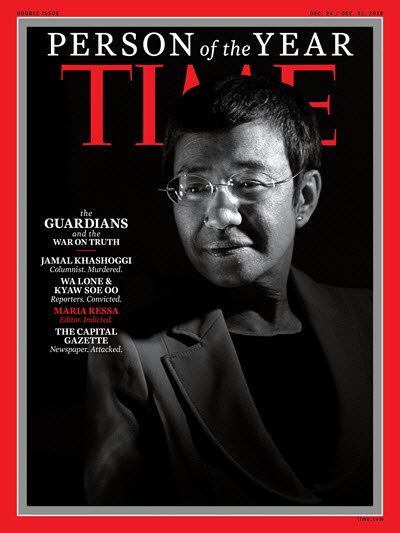
On February 13, the CEO of Philippine news website Rappler, Maria Ressa, was arrested and charged with cyber libel crimes for a 2012 story that was published four months before the law she is said to have breached was enacted.
It was the latest attempt by the country’s government to silence the seven-year-old publication. Rappler has has been at the forefront of reporting on President Rodrigo Duterte’s campaign of extra-judicial killing of drug dealers and users — a campaign that has led to the deaths of more than 10,000 people in less than three years.
Ressa has said she cannot talk about the case at the moment, but in an interview with Crikey, veteran Filipino journalist and activist Inday Espina-Varona, who last year won the Reporters without Borders award for independence, explains:
Crikey: The Philippines has such a vibrant and committed media sector compared with other Southeast Asian countries. Why is that?
Inday Espina-Varona: It’s been hard won during the fight against the Marcos regime. After the fall of Marcos, we write what we want to write. It’s enshrined in the constitution. Since 1986 there have been attempts to curb press freedom and we have always fought back against that.
We do have a vibrant press that fights for its rights, but we also have one of the highest rates of journalist murders in the world because there is impunity when it comes to this.
There is really only a thin veneer of democracy in the Philippines; when you scratch the surface, it’s really a feudal set-up, in the provinces. The thin line is between governments and criminals — there are lots politicians in the provinces that were former crime bosses.
What has been the situation under Duterte?
Twelve journalists have been murdered since he came to power. Before he assumed power, Duterte very publicly said that no one would kill you if you are a good journalist. Under Duterte, the military has named the media as a threat to the state in private presentations. This also happened under the presidency of Gloria Macapagal Arroyo.
Arroyo padlocked one tabloid and tried to padlock another. At the time I was president of the National Union of Journalists of the Philippines, I was told I was being followed by the military’s secret police. [Arroyo is now Speaker of the House of Representatives — and a Duterte ally.]
What is Rappler and why has it been targeted?
In 2011, Maria started Rappler. Like many of us, she is a believer in the brave new world of digital media and thought there was a place for a kind of news organisation that worked in partnership with its readers … Still, not everyone likes it, and it had bumped up against the traditional media due to its new methods. Sure, it may have overreached at times, but who in the media has not?
It had the best coverage of extra-judicial killings, and it harnessed multimedia better than its rivals. It took stories [and made readers] see this is about people, not just numbers, and also earned the ire of this government. Duterte’s anger peaked when one of his favourite aides was the subject of a Rappler expose about alleged interference in and embezzlement of state purchases of navy equipment.
Rappler CEO Maria Ressa has been charged with cyber libel crimes. Can you explain these?
Libel laws have always been very restrictive, but cyber libel has penalties higher than regular libel. The Department of Justice has allowed these laws to become retrospective (hence Ressa’s charges) by creating the concept of “continuing crime” because of a constant real-time existence online.
It’s emblematic of the Duterte government: he has removed the chief justice and politicised the Department of Justice, allowing the “re-interpreting” of libel laws.
In March 2018, the Securities and Exchange Commission (the companies’ regulator) cancelled Rappler’s registration. The SEC’s main role is to help businesses correct their “infirmities”, yet Rappler was not approached with help. It’s interesting too — the time it has taken for different government agencies to issue arrest warrants and cancel the registration was very quick, compared with the long gestation time of other SEC cases.
Soon after that, a ban was put on Rappler reporting from Malacañang Palace [the presidential palace] or any appearance by Duterte — even stringers, so they would think twice about working for Rappler. It’s really overt hostility.
Tell us about Maria Ressa.
We have known each other for a long time. Not too long ago, when we spoke she asked me, “how do you deal with this?”
Maria is schooled in the western terms of “journalism of balance”. I am an activist journalist, I started at the end of the Marcos regime when journalists had to become activists. You need to engage; you need to speak out. Maria preferred to let the stories do the talking. She was with CNN for a long time in Jakarta, so she had distance from the hurly-burly of politics. But tyrants will drag journalists into that hurly-burly.

So, this has only persuaded her that she needs to be an activist and strengthened her; she has a lot of support from international, journalist friends. [Ressa was one of Time Magazine’s People of the Year in 2018].
The people who know me know that I am not radical, but government actions like this, it forces me to speak. I think we all have to speak… This is the time to fight.
Maria Ressa, December 2018
Following Ressa’s arrest, a major newspaper appeared to buckle to government pressure removing a story from the internet. I can understand why The Philippine Star got nervous … We are probably going to see a lot of owners of media outfits, getting scared and risking less. Most of them have other, vulnerable business interests. That is the chilling effect of this.
Are journalists fighting back?
Yes. When it’s killings we all stand up, but we have never been that united. We are a reflection of our society, and political families have always been in that dynamic in terms of ownership with or support by media groups. We had a small but noisy protest last Friday.
It’s disappointing the National Press Club [known for its good relations with the presidential palace, regardless of the occupant] opted to support the government by basically apologising for Rappler. On the other hand, I see that a lot of netizens [internet users] and citizen journalists are testing the libel laws by posting material involved in the Rappler case. The government can’t arrest them all.








What a shame that uncompromised journos. are under threat in some dodgy foreign country.
So unlike the West, just ask John Pilger, Glenn Greenwald, Robert Parry (dcd), Sy Hersch, Noam Chomsky…
How many members of this government and their media caravan wouldn’t love Duterte’s powers – over those “recalcitrant” elements of the ABC and anyone else in the media asking embarrassing questions, expecting answers and accountability?